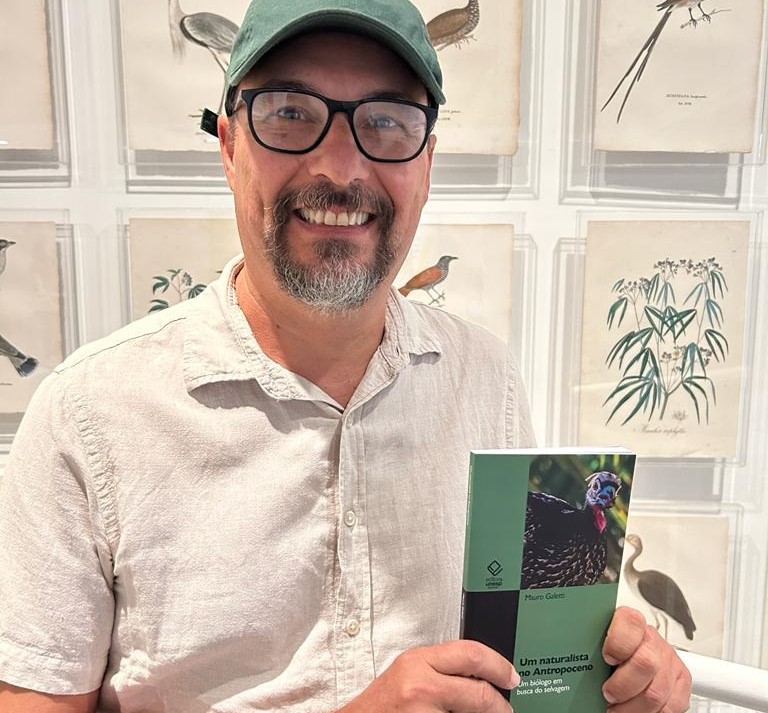

Mauro Galetti Rodrigues is a member of the board of the Biodiversity and Climate Change Research Center, a FAPESP RIDC based at the Rio Claro campus of São Paulo State University (photo: CBioClima)
Written by São Paulo State University’s biologist Mauro Galetti Rodrigues, A Naturalist in the Anthropocene aims to inspire young scientists and nature lovers.
Written by São Paulo State University’s biologist Mauro Galetti Rodrigues, A Naturalist in the Anthropocene aims to inspire young scientists and nature lovers.

Mauro Galetti Rodrigues is a member of the board of the Biodiversity and Climate Change Research Center, a FAPESP RIDC based at the Rio Claro campus of São Paulo State University (photo: CBioClima)
Agência FAPESP – Bringing readers a mixture of autobiography and reflections on the future in the “age of humans” is the aim of the book Um Naturalista no Antropoceno (“A Naturalist in the Anthropocene”, Editora Unesp, 2023) by Mauro Galetti Rodrigues, a professor at the Institute of Biosciences of São Paulo State University (UNESP) in Rio Claro, Brazil, and one of the directors of the Center for Research on Biodiversity Dynamics and Climate Change (CBioClima) – a FAPESP Research, Innovation and Dissemination Center (RIDC).
The book brings together his experiences of traveling to inhospitable places such as the Galapagos Islands, the Bahamas and Borneo, and his training as a scientist. “A Naturalist in the Anthropocene is a book to inspire young scientists and nature lovers. I hope it changes the way people see nature. With a critical and humorous eye, I try to discuss and reflect on the role of human beings on planet Earth and discuss ways we can survive the Anthropocene,” Rodrigues told Agência FAPESP.
According to the professor, there is a gap for books written by scientists in Portuguese. “I grew up in biology reading Ed Wilson [1929-2021], Jared Diamond and other English-speaking scientists, but I think there’s a lot missing in these authors, they sometimes have an incomplete view of nature conservation. We have many scientists in Brazil who could write excellent books and thus motivate new young people to take up science. More than attracting readers to texts written by scientists, I hope that scientists will feel motivated to publish their books,” he says.
Rodrigues points out that FAPESP was very important in putting together the book, with some chapters linked to projects funded by the Foundation (05/52726-9, 07/03392-6, 08/10154-7, 14/50434-0 and 14/01986-0) and to other support he has received throughout his career. “In this book, I compile work and experiences funded during this trajectory,” he says.
The book has 184 pages and costs BRL 67.00 in physical format. For students and readers who do not have the funds, Editora Unesp is making the book available for free in digital format, which can be downloaded from the publisher’s website.
Republish
The Agency FAPESP licenses news via Creative Commons (CC-BY-NC-ND) so that they can be republished free of charge and in a simple way by other digital or printed vehicles. Agência FAPESP must be credited as the source of the content being republished and the name of the reporter (if any) must be attributed. Using the HMTL button below allows compliance with these rules, detailed in Digital Republishing Policy FAPESP.





